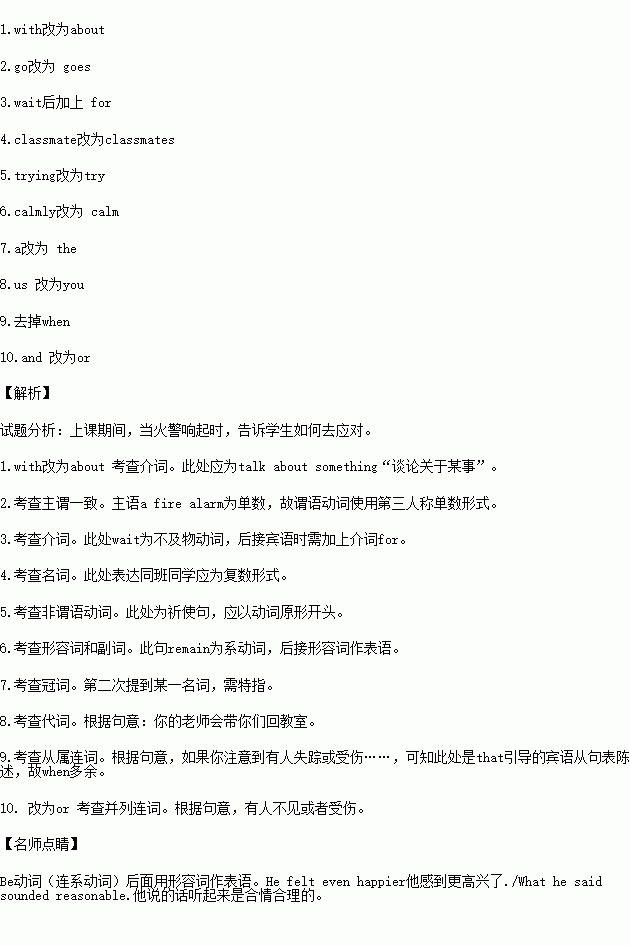ĢāÄæÄŚČŻ
¶ĢĪÄøÄ“ķ
¼Ł¶Ī¶ØÓ¢ÓļæĪÉĻĄĻŹ¦ŅŖĒóĶ¬×ĄÖ®¼ä½»»»ŠŽøÄ×÷ĪÄ£¬ĒėÄ抎øÄÄćĶ¬×ĄŠ“µÄŅŌĻĀ×÷ĪÄ”£ĪÄÖŠ¹²ÓŠ10“¦ÓļŃŌ“ķĪó£¬Ćæ¾äÖŠ×ī¶ąÓŠĮ½“¦”£“ķĪó½öÉę¼°Ņ»øöµ„“ŹµÄŌö¼Ó”¢É¾³ż»ņŠŽøÄ”£
Ōö¼Ó£ŗŌŚČ±“Ź“¦¼ÓŅ»øöĀ©×Ö·ūŗÅ£Ø £©£¬²¢ŌŚĘäĻĀĆꊓ³öøĆ¼ÓµÄ“Ź”£
£©£¬²¢ŌŚĘäĻĀĆꊓ³öøĆ¼ÓµÄ“Ź”£
ɾ³ż£ŗ°Ń¶ąÓąµÄ“ŹÓĆ£Ø£Ü£©»®µō”£
ŠŽøÄ£ŗŌŚ“ķµÄ“ŹĻĀ»Ņ»ŗįĻߣ¬²¢ŌŚøĆ“ŹĻĀĆꊓ³öŠŽøÄŗóµÄ“Ź”£
×¢Ņā£ŗ1£®Ć擦“ķĪó¼°Ę䊎øľł½öĻŽŅ»“Ź£»
2£®Ö»ŌŹŠķŠŽøÄ10“¦£¬¶ąÕߣؓӵŚ11“¦Ęš£©²»¼Ę·Ö”£
Hello, boys and girls! Today, I am going to talk with what you should do when a fire alarm go off. If you hear the alarm, stand in line at the door and wait your teacher to lead you outside. Stay close to your teacher and classmate. DonӮt panic or get out of line, and trying to remain quiet and calmly. Soon the firefighters will come and put out a fire. If itӮs a false alarm and there is no fire, your teacher will lead us back to the classroom. If you notice that when someone is missing and hurt, tell your teacher immediately.
 ĆūŠ£æĪĢĆĻµĮŠ“š°ø
ĆūŠ£æĪĢĆĻµĮŠ“š°ø
